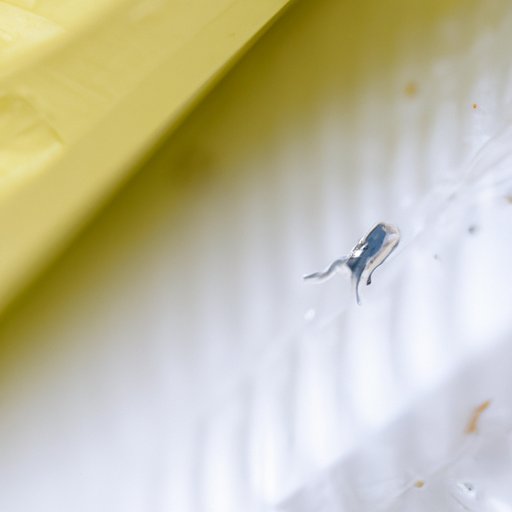
Introduction
If you’ve ever noticed tiny, jumping insects in your home, there’s a good chance they are springtails. While they are not harmful to humans, these pests can be a nuisance and difficult to get rid of. In this article, we will discuss several methods for eliminating springtails and preventing future infestations in your home.
DIY Methods for Eliminating Springtails
One of the most effective and natural ways to get rid of springtails is to reduce the levels of moisture in your home. Springtails thrive in damp areas, so it’s important to keep your home as dry as possible. You can achieve this by fixing any leaks, using a dehumidifier, and properly ventilating your home. Additionally, regular vacuuming can help remove springtails and their eggs from carpets and other surfaces.
Another natural method to eliminate springtails is to use essential oils or diatomaceous earth. Essential oils like tea tree, peppermint, and clove can create a barrier against springtails and deter them from entering your home. Diatomaceous earth, a natural sedimentary rock, can also be used to create a barrier. When springtails come into contact with it, they dry out and die.
To use essential oils or diatomaceous earth as a barrier, sprinkle it around the baseboards and entry points of your home. You may also want to consider using sticky traps to capture springtails.
Chemical Treatments for Springtails
If all-natural methods are not effective, you may need to use chemical treatments to get rid of springtails. Insecticides and bug bombs are two options for eliminating springtails. Insecticides can be applied to specific areas where springtails are present, while bug bombs release a fog of insecticide throughout the entire room.
However, before using chemical treatments, it’s important to weigh the pros and cons. Chemical treatments can be harmful to pets and humans if used incorrectly, and they may not eliminate all springtails if not applied properly. It’s also important to consider the potential long-term effects of chemicals on your home and the surrounding environment.
If you choose to use chemical treatments, it’s important to follow all safety precautions on the label. Wear protective gear, keep pets and children away from the treated area, and ventilate your home thoroughly afterward.
How to Prevent Springtail Infestations
Preventing springtail infestations is key to avoiding the need for elimination in the first place. One way to do this is to seal cracks and crevices in your home to prevent entry points for springtails. Additionally, removing sources of moisture in your home, such as leaky pipes and standing water, will discourage springtails from taking up residence.
It’s also important to store food in airtight containers and keep your home clean and clutter-free. This will prevent springtails from having access to food and hiding places.
When to Call in the Professionals for Springtails
If you’ve tried DIY and chemical methods without success, it may be time to call in a pest control professional. Signs that your springtail infestation is too big to handle on your own include a large number of springtails, their presence in multiple areas of your home, and ongoing reinfestation.
When working with a professional, you can expect them to inspect your home, identify the source of the infestation, and recommend appropriate treatment methods. They may also suggest additional prevention methods to keep springtails from returning.
Understanding Springtails
Springtails are tiny, wingless insects that are typically less than 1/16 of an inch in length. They come in a range of colors, including white, gray, black and brown, and are known for their ability to jump several inches into the air. Springtails feed on decaying organic material and fungi and are generally harmless to humans and pets.
It’s important to be able to distinguish springtails from other pests, as different types of insects require different methods of elimination. Springtails can be identified by their unique spring-like mechanism on the underside of their abdomen.
Conclusion
Eliminating and preventing springtail infestations requires a combination of all-natural, chemical, and prevention methods. By implementing these strategies, you can reduce the moisture levels in your home, create a barrier against springtails, and seal off entry points. Remember to follow all safety precautions when using chemical treatments and consider calling a professional if necessary. With patience and persistence, you can successfully eliminate and prevent springtail infestations in your home.




